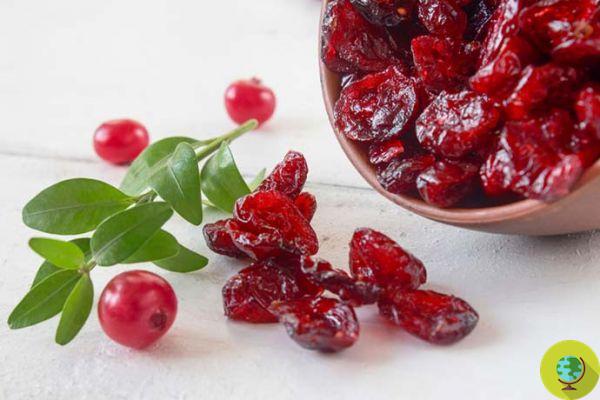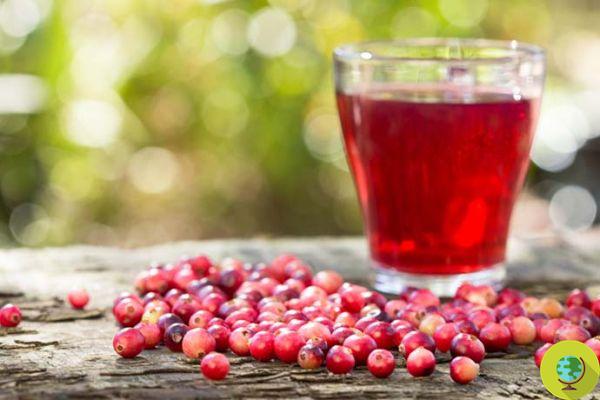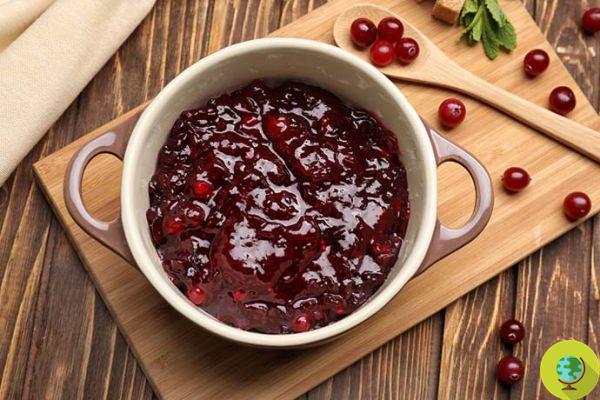Cranberry or American cranberry, a natural remedy known above all for cystitis but also an excellent fruit to drink in the form of juice or to be included in fruit salads and smoothies for its characteristic sour taste and its nutritional characteristics. We know better all the benefits of the cranberry but also the possible contraindications.
Don't store avocado like this: it's dangerous
Cranberry or American cranberry, a natural remedy known above all for cystitis but also an excellent fruit to drink in the form of juice or to be included in fruit salads and smoothies for its characteristic sour taste and its nutritional characteristics. We know better all the benefits of the cranberry but also the possible contraindications.
Blueberries are very popular fruits but the red variant (Vaccinium macrocarpon) is probably the least known, widespread and used. These little berries to eat as they are or to use in different recipes often prove useful in treating a number of health problems as well.
Cranberry of American origin was already used by ancient local populations for urinary tract infections but also as an antibacterial to disinfect wounds. This small fruit, whose properties have also been confirmed by scientific research, in fact contains many substances (including flavonoids, anthocyanosides, citric acid and malic acid) capable of carrying out an antibacterial action and regulating the pH of the urine.
Index
Cranberry, property
Health benefits of blueberries include supporting good oral hygiene, treating kidney and bladder problems, supporting good heart health, weight loss, treating urinary tract infections, promoting skin health and more.
Blueberries are loaded with antioxidants and nutrients, and eating them regularly can offer several health benefits. Between these:
- Better oral health: eating cranberries helps to avoid plaque buildup, tooth decay and gum disease.
- Kidney and bladder problems: Cranberries contain citric acid and other nutrients that can help prevent kidney and bladder problems. They can also prevent kidney stones from forming.
- For urinary tract infections: Cranberry juice is refreshing and moisturizing, great for those with frequent urinary tract infections such as cystitis. Good results are obtained above all by using the cranberry for preventive purposes but this remedy is often recommended in association with others always of natural origin (and in some cases with antibiotics) also to treat sporadic or recurrent cystitis. The high level of antioxidant proanthocyanidins (PACs) in cranberries help stop certain bacteria from adhering to the walls of the urinary tract. In this way, the PACs in blueberries help prevent infection. However, researchers at the Texas A&M Health Science Center in Houston College of Medicine found that while cranberry tablets can, cranberry juice is unlikely to have the same effect. This is because a high concentration of blueberry is needed to prevent bacterial adhesion. The juices we drink do not contain such high amounts of PAC.
- Benefits for the heart: Thanks to the presence of various minerals and enzymes that can help reduce bad cholesterol, cranberries are particularly beneficial for the heart.
- Antioxidants: cranberries are rich in antioxidants useful in counteracting cellular aging. This is also a great help in warding off the risk of some types of cancer.
- Weight loss: thanks to the presence of antioxidants and other substances of which they are rich, blueberries improve the functions of the digestive system and promote metabolism, which brings benefits to those who have to lose weight.
- Strengthen the immune system: Cranberries help prevent inflammation and strengthen the immune system.
- For the well-being of the skin: thanks to the presence of antioxidants that counteract free radicals and vitamin C, cranberries also help the well-being of the skin which they help to keep hydrated, limiting the appearance of wrinkles among other things.

Cranberry, nutrition facts and calories
100 grams of cranberries they bring about 46 kcal to our body. Regarding the nutritional values:
- 0,1 g fat
- Saturated fatty acids 0 g
- Polyunsaturated fatty acids 0,1 g
- Monounsaturated fatty acids 0 g
- Cholesterol 0 mg
- Sodium 2 mg
- Potassium 85 mg
- G carbohydrates 12
- Dietary fiber 4,6 g
- Sugar 4 g
- 0,4 g protein
- Vitamin A 60 IU
- Vitamin C 13,3 mg
- Calcium 8 mg Iron 0,3 mg
- Vitamin B6 0,1 mg
- Magnesium 6 mg

Cranberry, usi
Cranberry can be eaten fresh as is or in the form of juice. For preventive or therapeutic purposes it is generally recommended to drink 2 or 3 glasses.
It also exists the cranberry supplement or the dry extract which should only be taken under the advice of an expert and which is available in all herbalists and pharmacies.
The cases where it can be useful are:
- prevention and treatment of urinary tract infections
- reduce flu and cold symptoms
- presence of Helicobacter pylori and stomach ulcers
- kidney stones
- improve memory
How to eat the American cranberry
Cranberry can be eaten fresh or dry (but be careful that it has no added sugars), for example as a mid-morning or mid-afternoon snack, or in the form of:
- shakes
- Estratti
- salads
- muesli
- jams
- sauces for roasts or vegetables
- syrups for pancakes or desserts
- juice
Since it is not available all year round (blueberries are harvested in September and October) and it is often not easy to find fresh berries either, we recommend that you freeze the cranberry so that you can then use it when needed.

Cranberry, contraindications
The cranberry has no particular contraindications or side effects apart for those who take anti-coagulant therapies, anti-aggregants or for diabetes. If you take drugs of this kind, for example warfarin (or coumadin), it is absolutely not recommended to associate cranberry in any form to avoid dangerous interactions.
In case you suffer from particular pathologies or are taking drugs, it is always good to ask your doctor for advice before regularly consuming American cranberry juice or worse still a supplement based on its active ingredients.
Read also:
- Natural cystitis remedies: Cranberry, the American cranberry
- Cranberries burn fat and limit cholesterol
- Cranberries to prevent urinary infections


























